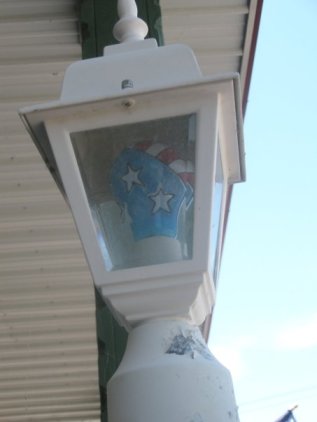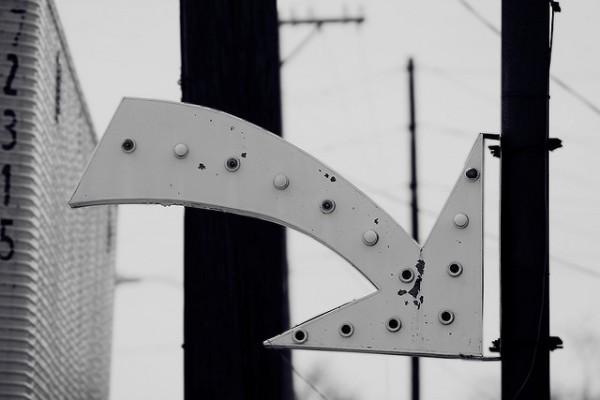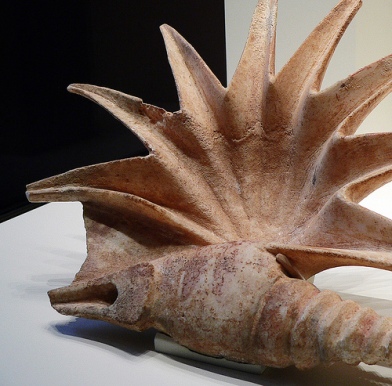The ocean is to blame, so let’s go there.
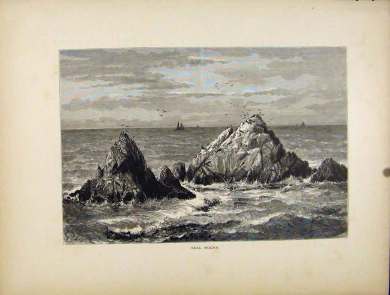
Ok, I caved.
I haven’t been writing anything resembling a blog post for a long time now, and it’s time I called it a day for QLP?. But if you’re interested in keeping up with my poems or seeing what strange chunks of the internet I’m patching together, do proceed to The Ocean Is To Blame. It’s where I live now, getting bitter at brine. But I promise it’s more fun than that.
Thank you for reading. See you in the ether.
“I softly explode like soda / opened underwater.”
Those are lines from Jessica Poli’s fantastic poem ’24’, originally published on elimae and making a brief guest appearance on The 24 Project, that superfast pop-up arts journal that everyone’s been tweeting about.
I have been lots of places lately. Not actual, in-the-world places, though I have been in those too. But while my body shuttles back and forth between raised bits of land, all the exciting travel has been done by poems.
- Two of my poems can now be found in issue eight of Specter magazine. They are about pretending to be the moon and having lots of feelings, and about Norse ghost-doubles and having lots of feelings.
- I wrote a poem especially for Aesthetix‘s third issue, Household Fires, and they liked it enough to give it a home! It is about powercuts and molecules and, unsurprisingly, fires in the household.
- Another poem I wrote is in the new Sixth Finch! This is one of my favourite magazines so I am super happy to be part of it. The poem is about small animals and winter and features rifles but is not as upsetting as it sounds.
- The aforementioned pop-up journal / social media experiment The 24 Project were also kind enough to take one of my poems. It is about wardrobes and teeth colliding and shedding clothes (which makes it sound far sexier than it probably is). It is only there for six more days so check out all the awesome stuff on the site while you still can.
- Last night I hosted a reading in Stirling! People showed up and listened to the poems and everything. Thanks to Miriam Gamble, Ryan Van Winkle, Billy Letford, Claire Askew and Dave Coates for being great poets and reading great poems and not calling bullshit on my emcee abilities. And thanks to everyone who came along for showing your beautiful faces.
So yes. That is what I have been up to, along with alternately adding and removing schools to my list of prospective MFA applications in varying degrees of panic. I thought I had loads of time and it turns out not so much. It’s scary, but good scary. Much like David Bowie’s acting career. I promise not to go on and on about this. I can’t promise that of either MFAs or David Bowie. I only have so much [which is not much] restraint.
“I’m an owl on the sill in the evening.”
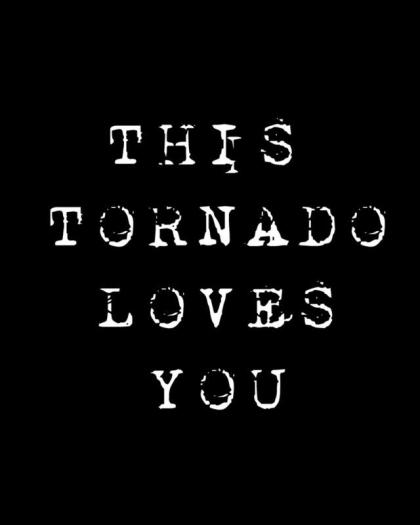
This is the closest I will get to affirming the value of love songs today.
But today is a really exciting day. Issue 2.3 of NAP goes live today, and damn is it stuffed with amazingness. Guest editor Gregory Sherl gives us Diana Salier, Andrew Cox, Melissa Broder, KMA Sullivan, David Greenspan, Rose Hunter among many others including ILK-kind M.G. Martin, Rob MacDonald, Parker Tettleton, Nick Sturm, Thomas Patrick Levy, Caroline Crew and myself. Whew.
Also new to the interwebs is the second issue of UP, a supremely sexy creation that for its sophomore outing ventures into animal love. Often literally. Because Valentine’s isn’t just for humans…apparently.
On top of that, the February issue of PANK appeared yesterday!
I think I need to lie down. The internet is just throwing all kinds of awesome at us this week. I’ve decided we don’t have time for candlelit dinners / chocolates / roses / all that bullshit. So this is the last we’ll say about it. Forget the relationships being rubbed in the world’s face and get on the lit mags. You’ll feel better for it.
Bless you, NAP / UP / PANK. Bless you.
Why I’m Applying to MFA Programmes in America
This kind of exposition isn’t usually my thing: it carries a sense of justifying (or even apologising for) my decisions that makes me uneasy. But I needed to order my own thoughts re: what I’m doing next, if only so I can have my reasons set down in front of me where I can look at them and be confident in them. I’ll admit that it’s probably not obvious why I’ve decided that I want to do a poetry MFA in the States. It certainly seems sudden. But the move West is one I’ve been mulling over for about a year now. It’s one that has required a lot of mulling. I’m currently enrolled in an MLitt – arguably the British equivalent of the MFA – so it seems redundant to want to do both, I guess.
It’s not. As much as I don’t regret taking the MLitt, what I’m reading (and consequently writing) has changed significantly in the past year or so. This is down to external influences like recommendations from friends but it has to be said that the immediate availability of new American literature online is a big reason for the shift. And what’s being published in these online publications is generally very different from what I’d been encountering on home soil.
In the creative writing class I took as an undergrad, the concrete was valorised over the abstract almost constantly. Sentiment and post-confessional internalising were evils to be purged. Formal experimentation didn’t really come into it.
That seems to have set the tone for my subsequent experiences as a writer in the UK. Any mention of poetry in the media seems limited to older poets with established reputations and comfortable mainstream inclinations, or younger poets making a name by emulating them. Don’t mistake me here: I still think that Carol Ann Duffy (for example) is a fine poet. But I get no sense of danger from that mainstream—nothing about it fizzes or yelps or clangs in my heart any more. It’s treading water, or at least gives that impression in my daily existence.
It probably didn’t help that I played it safe throughout my undergrad, taking Contemporary British & Irish Poetry over American Poetry Since 1950 because I knew so little about what was happening on the other side of the pond. My dissertation snuggled easily into a poking-around of linguistic trends in Britain. In a way this was a microcosm of what I was doing in life: staying in my comfort zone. But I’m done being comfortable.
I want abstraction and experimentation.
I want to shout about my joy and my despair.
I want to cheer loudly, not clap politely.
I want to curse freely in my poems without apologising to the reader.
I want to write poems that just don’t make sense and have it not matter because sense is as subjective as everything else.
I want to not get tied up in the definition of terms like ‘prose poem’ or ‘hybrid text’ because a piece is a piece and under its skin everything is really poetry.
If I wanted to do any of that here, I’d have to accept being sidelined as inaccessibly weird or—god help me—postmodern. To be a postmodern poet in the UK often entails being brushed off or sneered at by the aforementioned mainstream, stuffed into a revisionist anthology that makes too much of you or entering a publishing circle-jerk. That kind of academic foppishness and self-imposed martyrdom is just not for me.
But in America I can sense hope! In the online independent scene you can be as odd and frank and lyrical and serious and madcap and jovial and maudlin as you like, as long as you do it honestly. If you want to write a surrealist piece of ekphrasis with Homeric allusion woven in with found material from all ten seasons of Friends, you can FUCKING GO FOR IT. That is an ethos I can get on board with. And yes, I’ve joined in and (so far) been accepted. There are people like James Tate and Heather Christle and Melissa Broder and Gregory Sherl (among countless others) who are testament to making this pop-culture-lost-generation-totally-bonkers century work as a shiny new poetry machine.
Yes, I’ve made myself a small part of that, via the internet. So why up sticks across the ocean when I’m involved from where I am?
Because I need to see it or I’ll lose it.
I can feel change and excitement firing through my veins every time I get a little bit closer to the heart of it. I know people who’ve been there (and back) and I love that I can party with the cool American kids digitally but it’s not enough. Breaking out of my parochial existence via the internet has made me better, but the writer I’m becoming can’t thrive here because (comparisons to whiny hipster mantras aside, please) there isn’t a place for what I’m producing in Britain any more. What I’m producing has been irreversibly altered.
It saddens me that there is no longer any palpable bridge between the poetry communities of the UK and US and god knows I am willing to start building but I can’t make a bridge without seeing both sides. I don’t want to forsake British poetry, I want to foster the thrill and the terror and the punch-in-the-gut-you’re-human! feeling I get from American poetry, on both sides of the Atlantic.
Britain, I still love you but I’m not living in you. I’m existing in you. America: you have my heart. I am applying to MFA programmes in you so you can have the rest of me.
The things I’ve been doing that aren’t nothing
So 2012 started, uh, gracefully as expected. On the penultimate day of 2011 Caroline and I had a glorious reunion (no, it really was — there was Springsteen) and danced into the night at a location that is never to be disclosed.
Bravely trudging through the hangover I made it to NYE itself, and was conscious long enough to hear the midnight countdown and then kiss everyone ever.
After that it’s a little hazy. I remember a taxi, and then BOOM. Whole new year. Whole new, um, month? My day-to-day remains mostly unchanged.
What IS new, though, is very exciting. And that is NEW NEW LIT MAGS.
Sixth Finch has a new issue out. And it’s amazeballs. I powered through it a ridiculous speed. Make sure you check out the poems by Donora Hillard, Cate Peebles and Emily Toder especially.
But there’s MORE. As well as the first new PANK of the year (which is always an event), the second issue of Aesthetix went up, early at that! These poems are united under the common title of Arrow, and there is a scary amount of talent here (once again a small child writes poetry better than me).
My runaway favourite from the issue though, has to be Melissa Broder‘s piece. Lord knows I’ve rambled enough about it on social media, but I love it so much I want y’all to read it here and now — check it:
ARROW
When I saw he’d have to take an overnight boat
to Hades, I knew he couldn’t handle the soot.
I was like Give me a bow right here I’ll shoot
a hole in the ground with my feathers all knit up.
It is my gift to help a man pass over
down a black and newly-shot hole.
A hole does seem poor consolation for age
so he always cries out like a bell on a tree.
But men are dirt servants making movements in the dark
and they know the steps of every wormy dance.
In his heart baby monsters beat an old milk pail
singing This is all you get and it is enough.
Poème du jour: Wendy Xu
I’ll make no bones about it: I love Wendy Xu‘s poems. A lot. And she has three cracking examples (from The Dream Horse) up at Nicholas Liu’s UNSWEPT, which is very new and very exciting. Xu is in remarkably good company; it’s a stunning first issue and certainly one to keep your eye on. I’m hovering nervously above the submissions link right now.
Wendy (hello if you’re reading this) is almost a poster-girl for debut issues — she popped up recently in Aesthetix‘s inaugural RED CAR IN THE FUTURE issue, and we were grateful to publish her work in the first ILK at the beginning of the month. And no, I’m not just plugging her because of that. I’m plugging her because she’s not only prolific but also a damn fine poet. See for yourselves:
*
8.
The trouble with loving someone else
is deciding where to put your hands,
at your sides you’re too disengaged
but held up, above your head like an offering
is offensive to anyone looking on.
God doesn’t care about your brief affair.
Today the newspaper says that a man
held his girlfriend hostage for 16 hours
while updating friends on his cell phone.
It’s ok to admit you want an audience.
When someone opens a door for you,
walk through it.
*
“I have looked at it so long / I think it is a part of my heart”
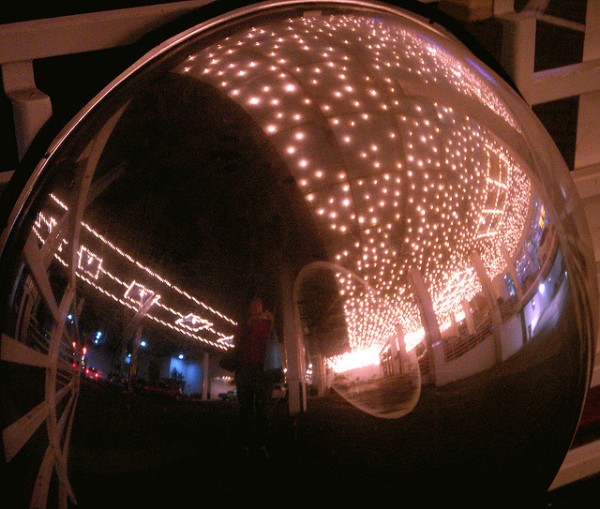 (Post title a quotation from ‘Mirror’ by Sylvia Plath)
(Post title a quotation from ‘Mirror’ by Sylvia Plath)
Among the many wonderful things I received for Christmas this year (pretty sure I still have the food baby) was an anthology — Modern Irish Poetry, ed. Patrick Crotty. This came from two of my parents’ closest friends, who have encouraged my reading since time immemorial. Just inside the book I found a pasted insert bearing a quotation from P.B. Shelley:
Poetry is a mirror which makes beautiful that which is distorted.
I’m sure many of you have heard / read this before. It rang a bell to me, however distantly. But that one little sentence — intended as a defence of the abstract ‘poetry’ — haunted me as I lay awake til seven a.m. (standard practice).
Why is the poem a mirror? I for one am sick of always looking into the poem and being confronted with me. Obviously that’s something I should take up with myself. I write the poem, and I am my own most common subject. I’m beginning to understand the advice I had from Meaghan Delahunt as an undergrad: get out of your head and come to your senses. In my case it’s more that I need to stop looking in the mirror and start looking out of the window.
This is about balance, of course. My crazy is an inexhaustible source of words, and I doubt I’ll be divorcing the confessional any time soon. But I can’t help feeling like I’m internalising too much. I have a lot of feelings and that’s good fuel, but there’s a whole world out there and maybe it’s time I sent my poems out into it.
In the Meadowlands poem ‘Rainy Morning’, Louise Glück says:
You don’t love the world. / If you loved the world you’d have / images in your poems.
I want to love the world you guys. So what do you think? Is the poem Shelley’s mirror is it Heaney’s stained-glass window?
“we are your kind / so be our kind”
After months of delays and snags and lots of shouting, we finally did it.
The first issue of ILK journal launched on the 1st of December and we have been utterly overwhelmed with the support and encouragement we’ve received. It’s really a stellar issue; I think it’s safe for me to say that both Caroline and I were humbled by the talent that submitted their wonderful words to us. We are proud to be able to give a home to these poems. It’s a home I’m particularly proud of, having spent hours of my inexplicable sleep cycle slaving over the CSS. But it’s here, it’s beautiful (if I do say so myself) and it dearly wants to meet you all.
On a personal level I want to thank NAP, PANK and > kill author for spreading the word and saying such lovely things about baby ILK. But the latter especially for all of their technical help when I was sending begging letters across the internet in a desperate bid to see the debut issue realised.
So, yes. Thank you all.
But of course, ILK is not a one-trick pony (ponies don’t have antlers). We are now OPEN FOR SUBMISSIONS for our second issue. And the fantastic responses we’ve had for Issue One mean we have a lot to live up to. So,
We want your poems. We want to shiver with them, laugh with them, get hot and heavy with them. We want your poems to meet our parents. We want to take your poems on the run from the law, rescue them from a burning building. We want to snuggle with your poems on the couch and microwave popcorn with them.
Submit to Issue Two of ILK here and make our new year. We close on the 15th of January, be quick but be kind.
We’ll experiment with you. Just try us.
“words that rhyme with /kwɪ(ə)r/”: an approximation of an update
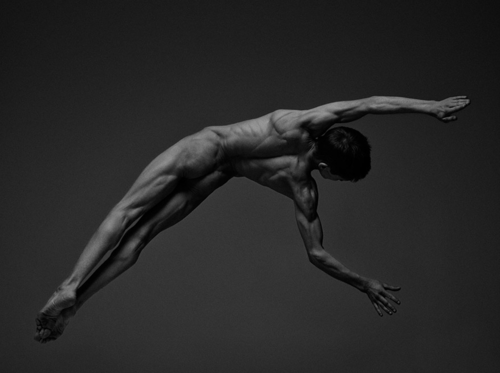
After all of my attempts at building hype, PANK Queer Two is here. I have a poem in it that does not make for comfortable reading. Not that reading should be comfortable — that’s what the chair is for.
The issue is introduced with a hybrid text / lyric essay / unidentified word object by Tracy Jeanne Rosenthal, who also contributes three engaging and unabashedly funny prose poems. Rosenthal says:
something about “qu” is phonetically off. a voiceless stop caught in your mouth. it resists being articulated. /kw/ wants to be /k/, but it wasn’t born that way.
Her bang-on interrogation of the language of queerness makes for the perfect segue into the issue. Also the fact that she manages to work Marx into the equation gave me a warm fuzzy feeling, as it’s not very often that I get to enjoy the synthesis of queer and Marxist (except when perusing my Twitter feed and realising that those two inclinations are the most common denominators among the people I follow).
The rest of the issue is a refreshing mix of literary objects — prose, poems, visual and hybrid pieces — many of which are accompanied by recordings of the work being read aloud. Sadly my own recording sounds like Jack Dee at a funeral, but deadpan is just how I roll. I try to be bright and conversational but the undertaker voice climbs out of my throat every time.
I’m rambling. Stop reading this and go read this. It (often literally) speaks for itself.
Today it’s rain of toads
Sometimes I think Xander from Buffy would have made a brilliant poet. He had the uncomfortable charm, the poverty and eventually the work ethic…not to mention that only a poet could really rock an eyepatch nowadays.
And there’s the toad thing. Which is really the main thing; I just like to get a tenuous Buffy link in wherever possible. There is a long-standing love affair between poets and toads (and frogs, but ‘toad’ is a nicer word). Indeed Norman MacCaig was famed for it, and readers’ comments on this fact in turn produced ‘My Last Word on Frogs’ (totally not his last word on frogs). There’s even an online literary journal called TOAD.
As MacCaig observes, they do keep jumping into poems. Kathleen Jamie’s poetry has seen frogs caught in coitus interruptus by an oncoming car, and a human speaker desperate to rescue them. A young Seamus Heaney flees from “the great slime kings” in the poem literature teachers just can’t let go of. Even younger poets like Jack Underwood have caught the toad pandemic, and Marianne Moore has gone so far as to call poems “imaginary gardens with real toads in them”. So why are these damned amphibians so important to poetry?
It may be that poets just can’t escape the life-cycle lessons from primary education — that the toad’s existence is the one most easily allegorised to the human condition. Maybe we feel guilty for all those biology class dissections and jars full of frogspawn, so we resurrect the dead in the impossible space of a poem (or countless, in this case). Maybe we see our own flaws in the toad’s warty visage, and we write them out of fellow-feeling. Maybe a poet is someone who never stops waiting to kiss the frog and marry the prince/ss.
Maybe I’ll stop idly wondering about this one day and make it my reserch interest for a PhD. Actually, that’s a good idea — shotgun!
For now, have MacCaig’s most famous toad poem (or listen to Jackie Kay read it), and enjoy my favourite opening line of all time:
Toad
Stop looking like a purse. How could a purse
Squeeze under the rickety door and sit,
Full of satisfaction in a man’s house?You clamber towards me on your four corners –
Right hand, left foot, left hand, right foot.I love you for being a toad,
For crawling like a Japanese wrestler,
And for not being frightenedI put you in my purse hand not shutting it,
And set you down outside directly under
Every star.A jewel in your head? Toad,
You’ve put one in mine,
A tiny radiance in a dark place.

